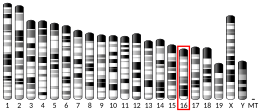Zinc finger protein 148 is a protein that in humans is encoded by the ZNF148 gene.[4][5][6]
Interactions
editSee also
editReferences
edit- ^ a b c GRCm38: Ensembl release 89: ENSMUSG00000022811 – Ensembl, May 2017
- ^ "Human PubMed Reference:". National Center for Biotechnology Information, U.S. National Library of Medicine.
- ^ "Mouse PubMed Reference:". National Center for Biotechnology Information, U.S. National Library of Medicine.
- ^ Tommerup N, Vissing H (May 1995). "Isolation and fine mapping of 16 novel human zinc finger-encoding cDNAs identify putative candidate genes for developmental and malignant disorders". Genomics. 27 (2): 259–64. doi:10.1006/geno.1995.1040. PMID 7557990.
- ^ Antona V, Cammarata G, De Gregorio L, Dragani TA, Giallongo A, Feo S (March 1999). "The gene encoding the transcriptional repressor BERF-1 maps to a region of conserved synteny on mouse chromosome 16 and human chromosome 3 and a related pseudogene maps to mouse chromosome 8". Cytogenetics and Cell Genetics. 83 (1–2): 90–2. doi:10.1159/000015138. PMID 9925940. S2CID 27825125.
- ^ "Entrez Gene: ZNF148 zinc finger protein 148".
- ^ Hasegawa T, Takeuchi A, Miyaishi O, Xiao H, Mao J, Isobe K (Apr 2000). "PTRF (polymerase I and transcript-release factor) is tissue-specific and interacts with the BFCOL1 (binding factor of a type-I collagen promoter) zinc-finger transcription factor which binds to the two mouse type-I collagen gene promoters". The Biochemical Journal. 347 Pt 1 (Pt 1): 55–9. doi:10.1042/0264-6021:3470055. PMC 1220930. PMID 10727401.
- ^ Bai L, Merchant JL (Jul 2001). "ZBP-89 promotes growth arrest through stabilization of p53". Molecular and Cellular Biology. 21 (14): 4670–83. doi:10.1128/MCB.21.14.4670-4683.2001. PMC 87140. PMID 11416144.
Further reading
edit- Wang Y, Kobori JA, Hood L (Sep 1993). "The ht beta gene encodes a novel CACCC box-binding protein that regulates T-cell receptor gene expression" (PDF). Molecular and Cellular Biology. 13 (9): 5691–701. doi:10.1128/mcb.13.9.5691. PMC 360303. PMID 8355710.
- Merchant JL, Iyer GR, Taylor BR, Kitchen JR, Mortensen ER, Wang Z, Flintoft RJ, Michel JB, Bassel-Duby R (Dec 1996). "ZBP-89, a Krüppel-like zinc finger protein, inhibits epidermal growth factor induction of the gastrin promoter". Molecular and Cellular Biology. 16 (12): 6644–53. doi:10.1128/mcb.16.12.6644. PMC 231666. PMID 8943318.
- Taniuchi T, Mortensen ER, Ferguson A, Greenson J, Merchant JL (Apr 1997). "Overexpression of ZBP-89, a zinc finger DNA binding protein, in gastric cancer". Biochemical and Biophysical Research Communications. 233 (1): 154–60. doi:10.1006/bbrc.1997.6310. PMID 9144414.
- Law DJ, Tarlé SA, Merchant JL (Feb 1998). "The human ZBP-89 homolog, located at chromosome 3q21, represses gastrin gene expression". Mammalian Genome. 9 (2): 165–7. doi:10.1007/s003359900711. hdl:2027.42/42145. PMID 9457682. S2CID 19151935.
- Law GL, Itoh H, Law DJ, Mize GJ, Merchant JL, Morris DR (Aug 1998). "Transcription factor ZBP-89 regulates the activity of the ornithine decarboxylase promoter". The Journal of Biological Chemistry. 273 (32): 19955–64. doi:10.1074/jbc.273.32.19955. PMID 9685330.
- Ye S, Whatling C, Watkins H, Henney A (May 1999). "Human stromelysin gene promoter activity is modulated by transcription factor ZBP-89". FEBS Letters. 450 (3): 268–72. Bibcode:1999FEBSL.450..268Y. doi:10.1016/S0014-5793(99)00509-8. PMID 10359087. S2CID 1858952.
- Hasegawa T, Takeuchi A, Miyaishi O, Xiao H, Mao J, Isobe K (Apr 2000). "PTRF (polymerase I and transcript-release factor) is tissue-specific and interacts with the BFCOL1 (binding factor of a type-I collagen promoter) zinc-finger transcription factor which binds to the two mouse type-I collagen gene promoters". The Biochemical Journal. 347 Pt 1 (Pt 1): 55–9. doi:10.1042/0264-6021:3470055. PMC 1220930. PMID 10727401.
- Bai L, Merchant JL (Sep 2000). "Transcription factor ZBP-89 cooperates with histone acetyltransferase p300 during butyrate activation of p21waf1 transcription in human cells". The Journal of Biological Chemistry. 275 (39): 30725–33. doi:10.1074/jbc.M004249200. PMID 10899165.
- Bai L, Merchant JL (Jul 2001). "ZBP-89 promotes growth arrest through stabilization of p53". Molecular and Cellular Biology. 21 (14): 4670–83. doi:10.1128/MCB.21.14.4670-4683.2001. PMC 87140. PMID 11416144.
- Park H, Shelley CS, Arnaout MA (Feb 2003). "The zinc finger transcription factor ZBP-89 is a repressor of the human beta 2-integrin CD11b gene". Blood. 101 (3): 894–902. doi:10.1182/blood-2002-03-0680. PMID 12393719.
- Chen GG, Merchant JL, Lai PB, Ho RL, Hu X, Okada M, Huang SF, Chui AK, Law DJ, Li YG, Lau WY, Li AK (Jun 2003). "Mutation of p53 in recurrent hepatocellular carcinoma and its association with the expression of ZBP-89". The American Journal of Pathology. 162 (6): 1823–9. doi:10.1016/S0002-9440(10)64317-9. PMC 1868140. PMID 12759240.
- Wu Y, Diab I, Zhang X, Izmailova ES, Zehner ZE (Jan 2004). "Stat3 enhances vimentin gene expression by binding to the antisilencer element and interacting with the repressor protein, ZBP-89". Oncogene. 23 (1): 168–78. doi:10.1038/sj.onc.1207003. PMID 14712222.
- Bai L, Yoon SO, King PD, Merchant JL (Jun 2004). "ZBP-89-induced apoptosis is p53-independent and requires JNK". Cell Death and Differentiation. 11 (6): 663–73. doi:10.1038/sj.cdd.4401393. PMID 14963412.
- Samuelsson L, Stiller C, Friberg C, Nilsson C, Inerot A, Wahlström J (Jun 2004). "Association analysis of cystatin A and zinc finger protein 148, two genes located at the psoriasis susceptibility locus PSORS5". The Journal of Investigative Dermatology. 122 (6): 1399–400. doi:10.1046/j.0022-202X.2004.12604.x. PMID 15175029.
- Beausoleil SA, Jedrychowski M, Schwartz D, Elias JE, Villén J, Li J, Cohn MA, Cantley LC, Gygi SP (Aug 2004). "Large-scale characterization of HeLa cell nuclear phosphoproteins". Proceedings of the National Academy of Sciences of the United States of America. 101 (33): 12130–5. Bibcode:2004PNAS..10112130B. doi:10.1073/pnas.0404720101. PMC 514446. PMID 15302935.
External links
edit- ZNF148+protein,+human at the U.S. National Library of Medicine Medical Subject Headings (MeSH)
This article incorporates text from the United States National Library of Medicine, which is in the public domain.

